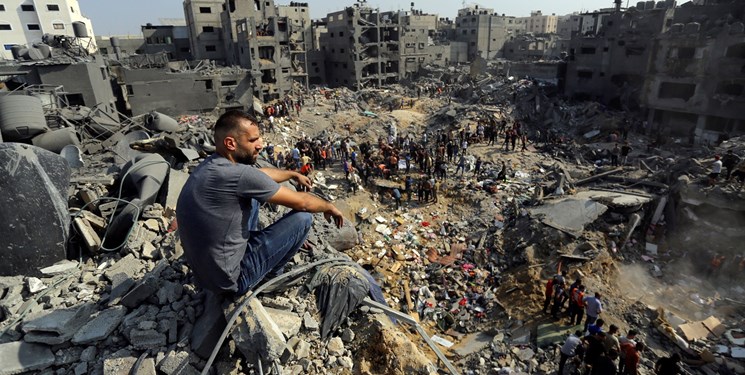According to a seven-page document that was provided to the Palestinian resistance groups during the Al-Aqsa Storm operation, “three scenarios” were considered for the future of Gaza months ago.
According to this confidential document, the Zionist regime was supposed to occupy Gaza in early 2024 with the start of an operation and temporarily displace the residents of this strip to the Sinai desert and other areas. In the next stage, a part of the relocated population should be returned to Gaza after being refined and obtaining strict guarantees so that all their connections with the Palestinian resistance are cut off and Gaza is “disarmed.”
In addition, the internal sources of the Zionist regime, including the “Israel Hayom” newspaper, in a report published recently, have announced the plan of the US Congress to displace the residents of Gaza to four countries, namely Turkey, Egypt, Iraq and Yemen, in exchange for economic incentives for these countries.
According to this Zionist plan, Egypt is the leading country and the first route for the evacuation of Gaza, which must cooperate with the United States and the Zionist regime in the field of accepting one million people from Gaza; otherwise, there will be no US “economic and financial aid.” The rest of the population will be settled in Turkey (500 thousand people), Iraq (250 thousand people) and Yemen (250 thousand people).
The point to ponder is that all four countries have many problems in the field of economy and livelihood, as well as attracting foreign investment, which require receiving foreign aid to solve them. For example, Egypt’s economy has been on the verge of bankruptcy in the last two years, and a third of its population lives in absolute poverty.
This country currently has about 200 billion dollars in foreign debt and needs hundreds of billions of foreign aid to overcome the economic crisis. This is a problem that the Americans have understood well and are seeking political exploitation to “change the geopolitics” of Palestine.
In addition, the army of the Zionist regime recently published a new plan for the evacuation of the Gaza Strip for the residents of the strip, which seems to be a “road map” for the future of the Gaza Strip. “Avichai Adraei,” the Arabic-speaking spokesman of the Zionist regime’s army, has also published maps on the X social network that determine which parts of Gaza the Palestinians should leave and where they should flee to.
Regarding the Gaza evacuation plan and its perspective, there are points to consider, the most important of which are mentioned below:
One: Contrary to all its claims and statements about the opposition to the forced relocation of Gaza residents and emphasizing the two-state solution, the US government is behind the scenes seeking to evacuate Gaza from the Palestinians. This means that the White House, with its “deception,” is the primary driver of the war and killing and the obstacle to the ceasefire in Gaza.
Without the coordination and support of the US, the Zionists are not able to evacuate Gaza, and they do not dare to talk about it. Therefore, the evacuation of Gaza is basically an American plan to remove the threats, ensure the security of the Zionist regime from the Gaza area, and facilitate the destruction of Palestine. “Protecting Israel’s security” by all and any means is one of the most important doctrines of American foreign policy.
Two: The bombing of residential and civilian areas and health and treatment centers, schools, energy transmission infrastructures, etc., by Israeli fighters, is actually a “tactic” to create terror and make people flee from Gaza, although the Zionist regime claims that the buildings and centers it bombards are the locations of Hamas forces and resistance fighters.
Three: The Gaza evacuation plan has two categories: “primary objectives” and “secondary objectives.” The primary goals include those mentioned in paragraph one and involve ensuring the security of the Zionist regime and establishing stability in the occupied lands. Security and stability in Gaza are preludes to pursuing secondary goals, mainly “economic and commercial.”
Exploiting the vast oil and gas resources in the Gaza Strip, which is nearly 1.5 trillion cubic meters, and also facilitating the construction process of the old “Ben Gurion Canal” plan, which was first proposed in the 1960s, are two strategic economic goals in this field.
The Ben-Gurion Canal is a significant economic idea that extends from the head of the Gulf of Aqaba (the eastern arm of the Red Sea) and through the Negev desert to the Mediterranean coast, connecting the Mediterranean Sea to the Red Sea. According to the Zionists, this canal would be an alternative to the “Suez Canal.” by taking away Egypt’s monopoly on the shortest route between Europe and Asia, the “dynamics of world shipping” would change!
Fourth, The evacuation of Gaza, although on paper it can be a very attractive plan for the Zionist regime and the US, is impossible to execute in practice. Contrary to the calculations of the United States and the Zionist regime, the conditions in Gaza have become drastically different from previous years. How can a regime that is stuck in Gaza despite having advanced military, intelligence, espionage, reconnaissance, and an army of more than 150,000 people and has not been able to achieve its minimum military goals claim to evacuate Gaza from its residents?!
In this regard, the four Arab countries, which, according to the American plan, should host the residents of Gaza, do not have the economic, social, political, and security conditions and facilities to accept such a population, and the “public opinion” of these countries and the region also shows a serious reaction to such a plan.
Meanwhile, the resistance groups will not allow the evacuation of Gaza and the free presence of Zionists in this region. Therefore, the mentioned plan cannot be implemented even in a situation where not even a single person has left Gaza in nearly two months of 24-hour bombardment.










0 Comments